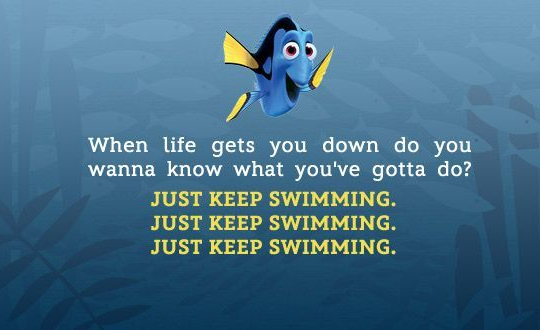If you’re like most people, when something bad is happening you don’t see it. Like, for example, your partner is cheating. You may sense it, you may think it, but you can’t admit it to yourself. So, you don’t.
A cheating partner is a common scenario. I get many readings on that topic. Someone may suspect it, they may worry about it, but they still don’t really want to see it. Who would? I get it.
My cousin died of breast cancer ten years ago. She did her best to hide it, even wearing layers of clothing to conceal her weight loss. Her mother, my aunt, whom she lived with, didn’t see it until it was too late. Why? Because she didn’t want to see it. Who would want to see that your daughter is slipping away?
It’s Human Nature
It’s human nature to ignore the things that we don’t want to see, that make us uncomfortable. It’s too scary or too sad. We don’t want to deal with it, so we don’t. That’s when we “stick our heads in the sand” as the saying goes. We would rather remain unaware to spare ourselves the pain. That strategy isn’t necessarily a bad thing, it’s a protective and common mechanism.
This situation can apply to anything in life. Not just a dying loved one but the world. Many people don’t pay attention to politics because they don’t want to know. It’s too painful or confusing so they ignore it. Again, that’s not necessarily a bad thing, it’s how they choose to not deal with it.
In everyday life it’s easy to continually ignore your teen’s messy room. Just shut the door and you don’t have to see it! Out of sight, out of mind. It’s another thing to miss the big things. That’s when I ask you to forgive yourself. You’re not a bad person for not seeing it!
If you have had that experience of ignoring something painful, please don’t beat yourself up. Recently I had that happen. Why didn’t I see it? What was wrong with me that I didn’t see it? All of these blaming thoughts racing in my head, beating myself up.
At the end of the day there was nothing that I could have done even if I had seen it earlier. What was going to happen was going to happen. Now I console myself with just that. I’m not a bad person for not seeing it. I’m not an uncaring person for not seeing it. Yes, I was preoccupied, but like my dying cousin, I could not have stopped it. It serves me best to get rid of the blaming thoughts. It may be normal to go there, but it doesn’t mean I have to stay there.
It’s a Real Thing!
If you didn’t see something going on you’re not stupid. Our brain protects us from pain by putting blocks up so that we can ignore the warning signs. Your dying loved one or cheating spouse could be too much for your brain to handle. So, it spares you the pain. It allows you to filter out the threats to your emotional well-being.
It’s like when our body goes into shock. Our body is on system overload, so it shuts down. We no longer feel physical pain and the mental chatter stops. Eventually we go unconscious because it’s too much to handle. Our brain protects us when the emotional or physical pain is too great.
To avoid feeling the pain we might soothe ourselves with comforting thoughts such as, “It’ll all work out.” Or “It’s not that bad.” Those might not be conscious thoughts, but our subconscious comforting us in the background. It allows us to stay tuned out so we don’t have to feel discomfort.
There’s a protective mechanism in our brain allowing it to be selective about what it sees and retains. I won’t get too technical on you so suffice it to say, science has proven there’s a part of the brain that filters things out. We can only focus on so many things at once. Our brain doesn’t have room for everything.
Quick example: are you paying attention to the chair that you are sitting on while reading this? Probably not. Your brain is focused on what you are reading, not what you are sitting on. Once your attention is drawn to it, now you might notice your chair.
It’s OK if You Missed It!
The point of this blog post isn’t to explain to you how the brain filters out extraneous information or even to prove to you that it does. What I’d like to stress to you is that if you missed something big like a cheating spouse or an elderly mother suffering from dementia, you’re not alone. People miss the signs all the time. My message to you is don’t beat yourself up if you did! It happens.
Logical people might rebut with, “Just because everyone else does it doesn’t mean I should let myself off the hook for it!” One can argue that’s true, but here’s the bigger question: what purpose does it serve to beat yourself up? NONE!
Ok, so you might’ve missed some big clues. You might’ve been too busy to notice. Or subconsciously didn’t want to notice. Either way, it’s OK! Regrets serve no positive purpose so do your best to let them go. If you’re confronted with the reality of a cheating spouse or a dying loved one, that’s sad and difficult enough as it is. Use your energy to deal with that, not to beat yourself up. Letting go of regrets is one of the best gifts that we can give ourselves. It frees us up to do what we really need to do – deal with the situation, even if the situation isn’t pleasant.
You know what they say, “Feel it to heal it!” Instead, put your attention on healing the deception from your partner or the pain of a dying loved one. It isn’t fun to feel those things but eventually it’s best if we do. Bottled-up feelings never do any good. Stop beating yourself up and let go of regrets. You will heal faster and feel better sooner.
Are you beating yourself up for not seeing something? Are you asking why you didn’t see it? Ask your best friend, the one that won’t judge you: your intuition. It will be honest with you. And give you suggestions to move through it if you ask.
If you want to learn how to listen to your intuition, how to talk to it and how to trust it by CLICKING
HERE.
Once you start listening to your intuition, you’ll be amazed how much your life clicks into place. Then you can truly start enjoying yourself. CLICK HERE to find out more!






